Home / Living With Eczema
Eczema Isn’t Easy.
Itching, pain, difficulty sleeping, missed activities—all of these are realities of living with moderate-to-severe eczema. Whether you have eczema or care for someone who does, you know these struggles well. But it’s the emotional impact of eczema that’s too often overlooked.
Feelings of embarrassment and shame about the condition are common and can affect family and social life in the forms of depression, anxiety, and isolation. It’s crucial you, or those you care for, share any negative emotions with the doctor.
Discuss both the physical and emotional impact of eczema. Also, understand the reasons why your or your loved one’s eczema keeps coming back. These discussions mean you and the doctor can more productively manage your or your loved one's condition.
When you or a loved one has eczema (atopic dermatitis), the amount of effort that goes into trying to avoid flare-ups can feel overwhelming. Find out what it’s like to live with chronic moderate-to-severe eczema.

 Living Day-to-Day
Living Day-to-Day

 Becoming an Empowered Patient
Becoming an Empowered Patient

 Finding Support
Finding Support

 Facing the Stigma
Facing the Stigma

 Living Day-to-Day
Living Day-to-Day

 Becoming an Empowered Patient
Becoming an Empowered Patient

 Finding Support
Finding Support

 Facing the Stigma
Facing the Stigma
Camille: Living day-to-day with eczema I would say is hard.
Tonya: It takes a lot of effort to deal with this on a day-to-day basis.
Heather: Having eczema can be tough. It’s a constant battle. It’s something that my body is fighting on the inside that you’re seeing on the outside.
Camille: Living day-to-day with eczema, it’s different every day. Some days you wake up feeling good and your skin is doing good and you feel pretty and you're going out and have a good day but sometimes it's horrible. You're cracking before you get home. You're just putting medicine in cracks just so you can get home and wash your hands or jump in the shower.
Tonya: Dealing with eczema every day is very frustrating. I have to shower often. I have to reapply my hand lotion, creams… I have to make sure I’ve kept my house clean of allergens. It can be very consuming.
Heather: You’re consciously always worried about what you might be wearing, what you might be exposed to, what you might come into contact with. I’ll start to clean up the kitchen after a meal and I’ll realize, “Oh, shoot, I don’t have my gloves on. Am I gonna get a flare?” I’ve learned that I always have to be thinking three to four steps ahead.
Tracy: My son had his first outbreak at age 12, and we’ve been dealing with eczema ever since. There’s no downtime. There’s no break. There is huge stress, financial strain. I think as a family you want to present “oh, we’re fine, we’re just going through some things. We’ll get over it. It- it’s okay.” But this is something that’s serious, ongoing, and runs your life, affects every aspect of your life.
Tonya: One of my big triggers is stress and I’ve learned that I need to deal with it with just writing stuff down, making lists, having a plan for myself and also setting some boundaries and not being overcommitted so that I can get the rest I need and hopefully prevent a flare-up.
Tracy: After many years of taking care of my son with eczema, I have learned that you need help. It takes the community. Reach out. Don’t keep it a secret. Use your support network.
Heather: Day-to-day, having eczema can be tough. You know, there will be, there’ll be good days and there’ll be bad days, but you just need to focus on those good days. You need to focus on the activities and the memories you are making and not let eczema define who you are.
Camille: I don’t stop activities with my grandchildren because I have eczema. So I try to do activities with them and play with them outside and help them ride their trike. But every time I do that, I have to go in the house and wash my hands, put on cream. They try to help me put it on. I have decided I’m not gonna let this eczema stop me from doing what I want to do.
Tonya: What I look for in a doctor is compassion and patience.
Tracy: You need to have someone who understands, that responds, that’s proactive.
Heather: Your doctor needs to be that partner, that fellow team member, because you’re going to be battling this together. I went through a number of allergists and dermatologists to finally find that one doctor who didn’t treat me like a number, who really saw Heather. And, you know, she took her hands into my hands and said, “We will find a solution.”
Camille: I feel it’s important to have the right doctor for eczema because that right doctor is going to be concerned about you and how you’re doing. A doctor that cares about you should notice how bad you feel on the inside.
Tracy: As a caregiver for my son who has severe eczema, we have a little litmus test when looking for doctors: Will you make my son give up his passion, his playing hockey? And we knew we found the right doctor when he said, “You know, I want you to be able to do the things you love, live the life you want, and I love a challenge and a puzzle. I’m going to help you.” My stress went from here down to here, ahhhhh (smiles).
Tonya: What’s been helpful for me in communicating with my doctor is having a list of maybe what I know are triggers or things that have happened, so I can tell them about that situation, making sure I have some questions prepared ahead of time…
Heather: In the beginning, I think I took on a lot of the “I’m fine, it’s OK, it’s not a big deal.” But I found I have to be honest with my doctor and say, “Today is not a good day. Today I am in pain. I am suffering.”
Tracy: Being a caregiver, I have learned to be quite forceful in stating where my son is in his flare, what he needs and really what I know will not work. You can’t be passive about it. You need to get in there and talk about it and drive the conversation.
Camille: Keep your doctor’s feet to the fire and leave a doctor if that doctor’s not answering your questions or making you feel like you’re being treated appropriately. You know, if I can’t get an appointment, my doctor tells me, “You don’t need an appointment. I know how bad your eczema is, you come on in.” That’s the kind of doctor I like.
Camille: Growing up all these years, I felt like I was the only one with eczema.
Tracy: Eczema is indeed a lonely place. You feel very isolated.
Tonya: When you have eczema, you want to be by yourself. I never thought about reaching out and trying to connect with other people that deal with it.
Camille: I think people don’t want to talk about eczema because it is a hidden disease. You are ashamed of having it. That’s just how you feel.
Tonya: It seems to be a common reaction to want to hide your eczema and not be super open about it. You feel like that pain is something you just want to deal with on your own and no one else is really gonna understand. But it’s important to reach out and connect with people that also have eczema because they know that feeling that you’re going through.
Heather: I'm finding the more and more I talk to people, the more and more I have put myself out there and been open about it, the more and more people I hear from who have eczema.
Tracy: For me, reaching out was a process. Eventually my son and I got to know another family that was dealing with eczema and that was huge. It was so nice to not have to explain, educate, excuse… It felt good. I wish I had reached out sooner. I wish I had found my community sooner.
Camille: Everybody needs some kind of support system with eczema. You need to surround yourself with good people, good people who you trust. I’m kinda closed about my eczema. I keep my circle tight, but the people who are in my circle, they are very supportive.
Heather: Having support from your family and friends is the most critical support that you can have, because you're gonna be going through this with them. And knowing that they're in your corner helps you get through.
Tonya: It’s been cool to connect with some other people that have also health with eczema. It makes me feel that I’m not alone.
Camille: It has been like therapy. I get to talk to people like me that have the same problems that I have. It’s just healing almost. You don’t feel like you’re the only one.
Heather: It’s really helped me with my confidence and my self-assurance that I can manage this condition and manage my care and it’s definitely helped me love being in my own skin.
Tonya: Sometimes the people doing my nails kind of make a weird face.
Heather: You can see it in their eyes. You can see the “I don’t want to be near her or touch her.”
Camille: I notice sometimes when people that haven’t been around me come to me, they’re sitting and they’ll scoot away. When I was in high school, I was scratching and one of my classmates said, “Ooh, you nasty.” I’ve had people pull their baby away from me. Sometimes people will ask me if I’ve been burned in a house fire.
Heather: I remember a time when I went to the hair salon and halfway through the service with the stylist, she refused to continue doing my hair because of my eczema.
Tonya: When I was a kid in school, I remember coming home crying because of things people said about me or to me regarding my eczema. It just was so hurtful. If I get negative reactions or comments, I really at this point, I’ve become less sensitive about it because I know that it’s something that’s out of my control and I’m doing the best I can do to take care of myself.
Camille: When people say thoughtless and insensitive things, I think that is really not my problem. That’s their problem. That’s how I feel. It’s your issue that you can’t handle the way I look.
Heather: I have found the best way to handle people’s reaction to my eczema is to educate them. I explain to people that my eczema is a chronic inflammation under the skin. I always assure them that eczema is not contagious. It’s not something that they can catch.
Camille: It’s not important to me anymore how someone feels about my skin. It used to be a very big focus in my life. Eczema is just another part of me, but I have lots of different parts of me that’s interesting too.
Heather: I have accepted what exactly is going on with my body and my skin, and I have learned that true beauty and true character comes from within.
Try the Atopic Dermatitis Control Tool (ADCT) questionnaire and share your results with your dermatologist or skin specialist.
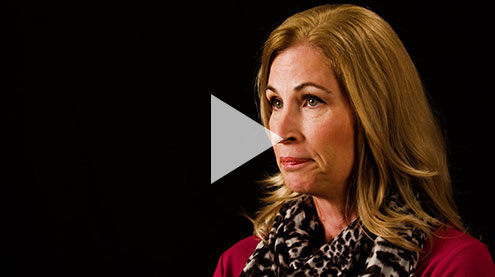
Mother Whose Son Has Been Living With Atopic Dermatitis Since Age 12
Eczema affects caregivers, too. Tracy's son Cole was 12 when he had his first flare-up, and it came out of nowhere. She had to spend so much time working to find the right treatment for her son that she almost lost her job. Get tips for talking with your child or their doctor about eczema.
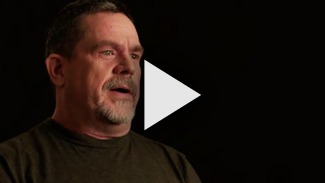
Father, Business Owner, Living With Atopic Dermatitis Since Childhood
Jason is not defined by his eczema, but he’s afraid that’s what people see first. On a bad day, it keeps him from doing the things he loves. He has to observe instead of participate—and that isn’t easy.
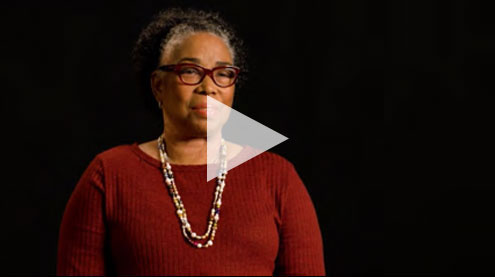
Mother & Grandmother, Living With Atopic Dermatitis Since Childhood
Growing up with eczema, Camille felt very lonely. It impacted her self-esteem, and she worried what others thought when they saw her scratching. Even now, it still hurts when Camille has a flare-up.
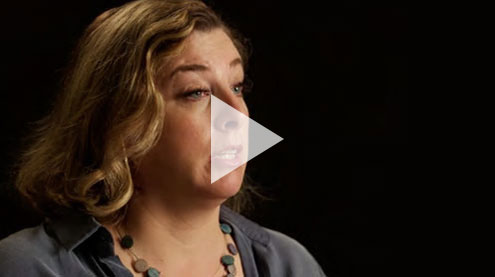
Mother, Living With Atopic Dermatitis Since Age 27
Heather just wanted to hold her baby, but the eczema on her hands would scratch her son's skin. Even holding her husband's hand was painful.
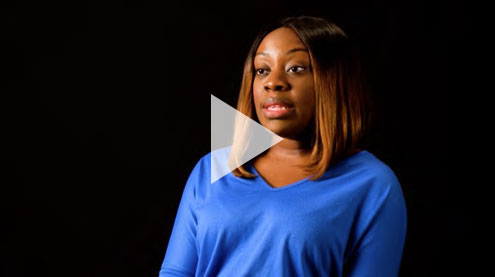
Teacher, Living With Atopic Dermatitis Since Age 12
Jalilah says her eczema is like the game whack-a-mole—once she finally gets a patch to go away, it pops up somewhere else on her body. It's frustrating, and it can feel like a burden.
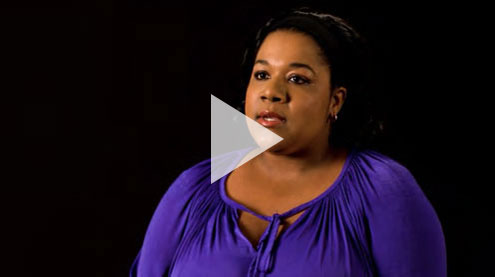
Office Manager, Living With Atopic Dermatitis Since Age 30
Serena describes eczema as a never-ending battle, like a fire you can't put out. It's isolating. When she has a flare-up, she just wants to hide under a rock. Eczema isn't just painful—it can feel isolating.